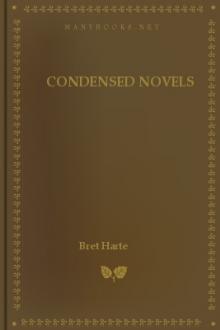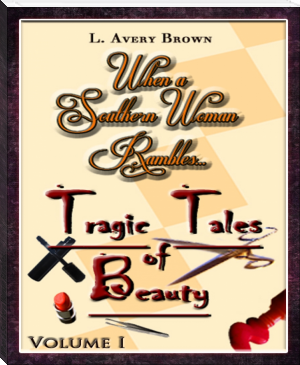Condensed Novels by Bret Harte (best books under 200 pages .txt) 📕

- Author: Bret Harte
- Performer: -
Book online «Condensed Novels by Bret Harte (best books under 200 pages .txt) 📕». Author Bret Harte
I was eight years old when I struck the first blow for Southern freedom against the Northern Tyrant. It is hardly necessary to state that in this instance the oppressor was a pale, overworked New England “schoolmarm.” The principle for which I was contending, I felt, however, to be the same. Resenting an affront put upon me, I one day heaved a rock* at the head of the Vandal schoolmistress. I was seized and overpowered. My pen falters as I reach the climax. English readers will not give credit to this sickening story,—the civilized world will avert its head,—but I, Mary McGillup, was publicly SPANKED!
* NOTE, BY G. A. S.—In the Southwest, any stone larger than a pea is termed “a rock.”
CHAPTER III.
But the chaotic vortex of civil war approached, and fell destruction, often procrastinated, brooded in storm.* As the English people may like to know what was really the origin of the rebellion, I have no hesitation in giving them the true and only cause. Slavery had nothing to do with it, although the violation of the Declaration of Independence, in the disregard by the North of the Fugitive Slave Law,** might have provoked a less fiery people than the Southrons. At the inception of the struggle a large amount of Southern indebtedness was held by the people of the North. To force payment from the generous but insolvent debtor—to obtain liquidation from the Southern planter—was really the soulless and mercenary object of the craven Northerners. Let the common people of England look to this. Let the improvident literary hack; the starved impecunious Grub Street debtor; the newspaper frequenter of sponging-houses, remember this in their criticisms of the vile and slavish Yankee.
* I make no pretension to fine writing, but perhaps Mrs. Hardinge can lay over that. O, of course! M. McG.
** The Declaration of Independence grants to each subject “the pursuit of life, liberty, and happiness.” A fugitive slave may be said to personify “life, liberty, and happiness.” Hence his pursuit is really legal. This is logic. G. A. S.
CHAPTER IV.
The roasting of an Abolitionist, by a greatly infuriated community, was my first taste of the horrors of civil war. Heavens! Why will the North persist in this fratricidal warfare? The expulsion of several Union refugees, which soon followed, now fairly plunged my beloved State in the seething vortex.
I was sitting at the piano one afternoon, singing that stirring refrain, so justly celebrated, but which a craven spirit, unworthy of England, has excluded from some of her principal restaurants, and was dwelling with some enthusiasm on the following line:—
“Huzza! she spurns the Northern scum!”
when a fragment of that scum, clothed in that detestable blue uniform which is the symbol of oppression, entered the apartment. “I have the honor of addressing the celebrated rebel spy, Miss McGillup,” said the Vandal officer.
In a moment I was perfectly calm. With the exception of slightly expectorating twice in the face of the minion, I did not betray my agitation. Haughtily, yet firmly, I replied:—
“I am.”
“You looked as if you might be,” the brute replied, as he turned on his heel to leave the apartment.
In an instant I threw myself before him. “You shall not leave here thus,” I shrieked, grappling him with an energy which no one, seeing my frail figure, would have believed. “I know the reputation of your hireling crew. I read your dreadful purpose in your eye. Tell me not that your designs are not sinister. You came here to insult me,—to kiss me, perhaps. You sha’n’t,—you naughty man. Go away!”
The blush of conscious degradation rose to the cheek of the Lincoln hireling as he turned his face away from mine.
In an instant I drew my pistol from my belt, which, in anticipation of some such outrage, I always carried, and shot him.
CHAPTER V.
“Thy forte was less to act than speak, Maryland! Thy politics were changed each week, Maryland! With Northern Vandals thou wast meek, With sympathizers thou wouldst shriek, I know thee—O, ‘twas like thy cheek! Maryland! my Maryland!”
After committing the act described in the preceding chapter, which every English reader will pardon, I went up stairs, put on a clean pair of stockings, and, placing a rose in my lustrous black hair, proceeded at once to the camp of Generals Price and Mosby to put them in possession of information which would lead to the destruction of a portion of the Federal Army. During a great part of my flight I was exposed to a running fire from the Federal pickets of such coarse expressions as, “Go it, Sally Reb,” “Dust it, my Confederate beauty,” but I succeeded in reaching the glorious Southern camp uninjured.
In a week afterwards I was arrested, by a lettre de cachet of Mr. Stanton, and placed in the Bastile. British readers of my story will express surprise at these terms, but I assure them that not only these articles but tumbrils, guillotines, and conciergeries were in active use among the Federals. If substantiation be required, I refer to the Charleston Mercury, the only reliable organ, next to the New York Daily News, published in the country. At the Bastile I made the acquaintance of the accomplished and elegant author of Guy Livingstone,* to whom I presented a curiously carved thigh-bone of a Union officer, and from whom I received the following beautiful acknowledgment:—
“Demoiselle:—Should I ever win hame to my ain countrie, I make mine avow to enshrine in my reliquaire this elegant bijouterie and offering of La Belle Rebelle. Nay, methinks this fraction of man’s anatomy were some compensation for the rib lost by the ‘grand old gardener,’ Adam.”
* The recent conduct of Mr. Livingstone renders him unworthy of my notice. His disgusting praise of Belle Boyd, and complete ignoring of my claims, show the artfulness of some females and puppyism of some men. M. McG.
CHAPTER VI.
Released at last from durance vile and placed on board of an Erie canal-boat, on my way to Canada, I for a moment breathed the sweets of liberty. Perhaps the interval gave me opportunity to indulge in certain reveries which I had hitherto sternly dismissed. Henry Breckinridge Folair, a consistent copperhead, captain of the canal-boat, again and again pressed that suit I had so often rejected.
It was a lovely moonlight night. We sat on the deck of the gliding craft. The moonbeam and the lash of the driver fell softly on the flanks of the off horse, and only the surging of the tow-rope broke the silence. Folair’s arm clasped my waist. I suffered it to remain. Placing in my lap a small but not ungrateful roll of checkerberry lozenges, he took the occasion to repeat softly in my ear the words of a motto he had just unwrapped—with its graceful covering of the tissue paper—from a sugar almond. The heart of the wicked little rebel, Mary McGillup, was won!
The story of Mary McGillup is done. I might have added the journal of my husband, Henry Breckinridge Folair, but as it refers chiefly to his freights, and a schedule of his passengers, I have been obliged, reluctantly, to suppress it.
It is due to my friends to say that I have been requested not to write this book. Expressions have reached my ears, the reverse of complimentary. I have been told that its publication will probably insure my banishment for life. Be it so. If the cause for which I labored have been subserved, I am content.
LONDON, May, 1865.





Comments (0)